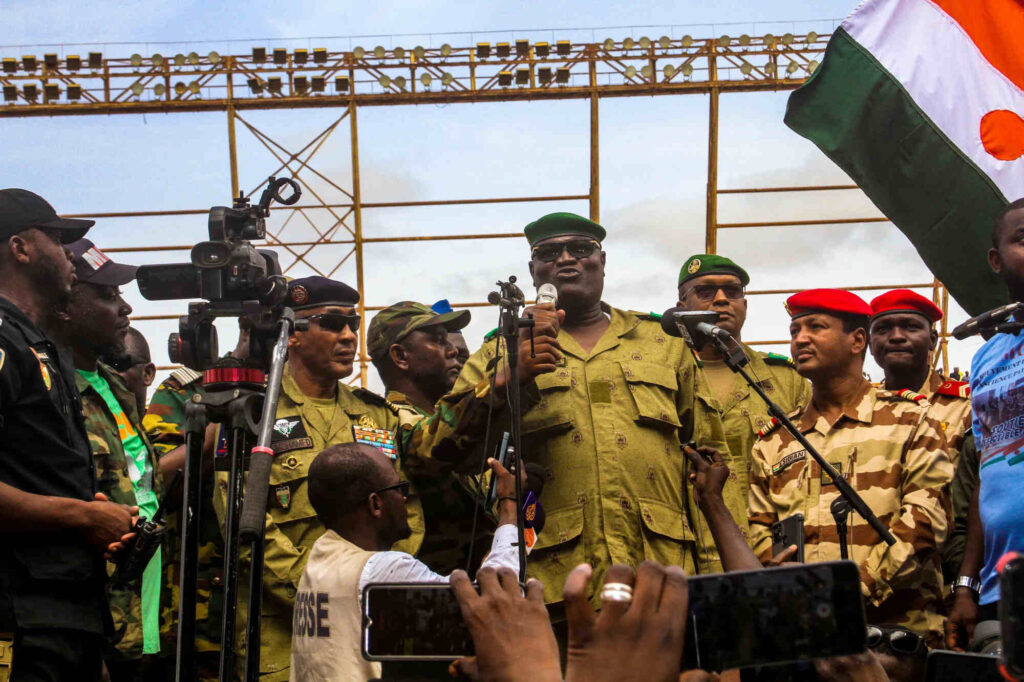Niger, one of the poorest and most unstable countries in the world, is experiencing a major crisis after a military coup, led by General Abdourahamane Tiani, the head of the presidential guard on July 26, 2023 toppled President Mohamed Bazoum, elected in February 2023 in a historic democratic transition.
The coup has triggered widespread condemnation from the international community, which has demanded the immediate release of Bazoum and the return to constitutional order.
The junta, which calls itself the National Committee for Reconciliation and Restoration (CNRD), led by General Abdourahamane Tiani accused Bazoum of fraud and corruption, and announced its intention to run the country until a new constitution and elections are held.

Regional bodies such as the Economic Community of West African States (ECOWAS) and the African Union (AU) have suspended Niger’s membership and imposed sanctions on the junta and its supporters.
Major powers such as France, the United States, the United Kingdom, Germany, and Russia have also expressed their concern over the developments in Niger and called for the restoration of democracy.
The coup has also sparked protests and counter-protests in Niger, with some people supporting the junta and others backing Bazoum. Some of the pro-junta protesters have expressed anti-French sentiment and waved Russian flags, reflecting their dissatisfaction with France’s role in the region and their hope for Russian military assistance through the Wagner group, a private security company allegedly linked to the Kremlin. On the other hand, some of the pro-Bazoum protesters have denounced the coup as a betrayal of the people’s will and a setback for democracy.
The Coup is the First in Niger’s History
The situation in Niger is complicated by the presence of various armed groups and terrorist organizations in the region, such as Boko Haram, Islamic State, Al-Qaeda, and Tuareg rebels. These groups have exploited the instability and poverty in Niger and neighboring countries to launch attacks and kidnappings.
Niger is also a key partner of France and the United States in the fight against terrorism in the Sahel region, hosting several military bases and troops . The coup has raised questions about the future of these cooperation efforts and their impact on the security situation.
Meanwhile, the CNRD has claimed that it acted to save Niger from “chaos” and “anarchy” caused by Bazoum’s “illegitimate” rule. It accused him of fraud and corruption, saying that he rigged the election with the help of former president Mahamadou Issoufou, who stepped down after two terms in office. The CNRD also accused him of mismanaging the economy, violating human rights, neglecting security issues, and alienating regional allies.
The CNRD declared itself as the supreme authority of Niger and dissolved all state institutions, including the parliament, the constitutional court, and the government. It appointed General Tiani as its president and Colonel Ibrahim Boubacar as its prime minister.
The CNRD (National Committee for Reconciliation and Restoration) claimed that it would respect its international obligations and commitments, and soon initiate a process of national dialogue to draft a new constitution and organize free and fair elections within a reasonable time frame.
While the CNRD claims to be acting in the best interests of the nation and its people, skepticism prevail among the various quarters, as to how the situation will actually turn out for the people of Niger.
What Niger’s Coup Means for France and USA

Historically, France has had a significant presence in Niger, as it once ruled the country as a colony. Niger obtained its independence from France in 1960. Following Niger’s independence, France maintained several hundred advisers at all levels of Niger’s government and military. In the 1960s, the Military of Niger was drawn entirely from Nigerien former members of the French Colonial Forces: officered by Frenchmen who agreed to take joint French-Nigerien citizenship.
Notable, France is also Niger’s top export partner (in value), and the French government almost entirely dependent upon Niger for the Uranium which fuels its extensive Nuclear Power system, mined in the northern town of Arlit.
The United States has also been involved in Niger, with a focus on supporting the country’s security forces to fight violent extremist organizations like Al-QAIDA and BOKO HARAM in the Sahel region.
The coup is confirming the collapse of US and France’s future role in the West Africa. The coup is the latest in a series of military takeovers in West Africa that have toppled governments in Mali, Burkina Faso, and Guinea. It’s a time of reckoning for these global powers, to re-evaluate their engagements in the region and strategize to mitigate potential security vacuums and geopolitical shifts.
The world is watching intently, hoping for a peaceful resolution that respects Niger’s sovereignty and the aspirations of its citizens for democratic governance.









